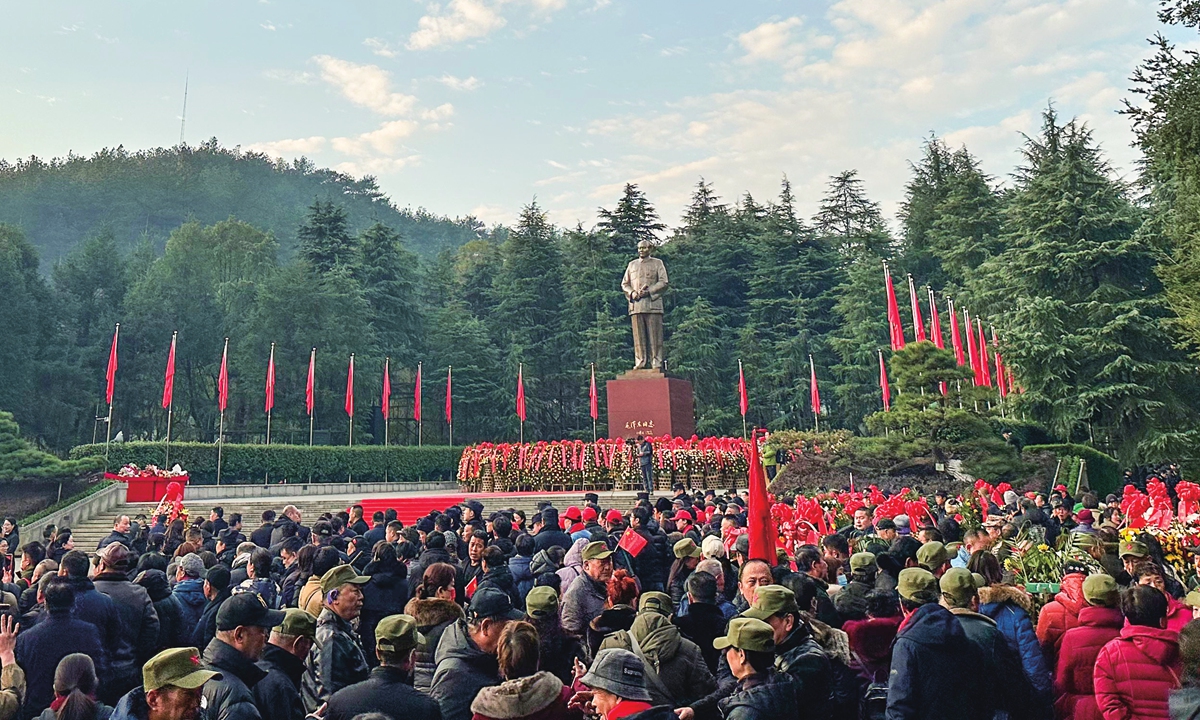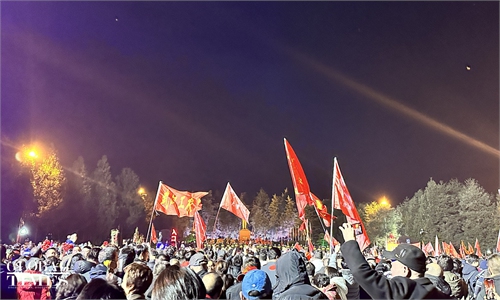
People gather at the Mao Zedong Square in Shaoshan, the late leader's hometown in Central China's Hunan Province, laying flowers in front of a giant Mao statue and singing the revolutionary song "The East Is Red" on December 26, 2023 to commemorate the 130th anniversary of Mao's birth. Similar events are also held in other places across China. Photo: Cui Fandi/GT
Commemorations to mark the 130th anniversary of the birth of People's Republic of China's founding leader Chairman Mao Zedong were held by the Communist Party of China, the Chinese local governments and Chinese people across the country on Tuesday.
From major cities like Beijing and Shanghai to Mao's hometown of Shaoshan in Central China's Hunan Province, as well as sacred revolutionary sites like Jinggangshan in East China's Jiangxi Province and Yan'an in Northwest China's Shaanxi Province, high-profile official and voluntary commemorations nationwide highlight the significance of Mao's thoughts, spirit and legacies on all fronts to not only China, but also to a world in turbulence, as experts remarked.
High-profile commemoration
The Communist Party of China (CPC) Central Committee on Tuesday morning held a symposium to commemorate the 130th anniversary of the birth of Comrade Mao Zedong, the Xinhua News Agency reported.
Xi Jinping, general secretary of the CPC Central Committee, Chinese president and chairman of the Central Military Commission, delivered an important speech at the symposium held in the Great Hall of the People in the heart of Beijing.
Xi stressed the importance of pushing forward the cause pioneered by Comrade Mao Zedong and called for efforts to build China into a stronger country and rejuvenate the Chinese nation on all fronts by pursuing Chinese modernization.
Mao Zedong Thought is an invaluable spiritual wealth for our Party and will guide our action in the long term, Xi said, underscoring that the best way to commemorate Comrade Mao Zedong is to continue to advance the cause pioneered by him.
Before the symposium, Xi and other members of the Standing Committee of the Political Bureau of the CPC Central Committee Li Qiang, Zhao Leji, Wang Huning, Ding Xuexiang, Li Xi and Vice President Han Zheng, as well as other senior leaders of the Party and the state gathered at the Chairman Mao Memorial Hall.
Xi and the leaders bowed three times to the seated statue of Comrade Mao and then went to pay homage to Comrade Mao's body in the hall where his remains lie.
Xin Ming, a professor at the Party School of the CPC Central Committee, told the Global Times on Tuesday that "when it comes to round numbers like the 110th, 120th and 130th anniversaries, China will surely organize a high-profile commemoration to pay tribute to Mao, and Chinese people will voluntarily pay tribute to him because Mao had made tremendous contributions to the happiness that we have today and to the rejuvenation process of the Chinese nation."
From 6 am on Monday to 5 pm on Tuesday, Mao's birthplace of Shaoshan welcomed 111,570 tourists, the Global Times learned from local tourism authorities, an increase of 712.93 percent from 2022 and 13.92 percent from 2019.
The city's tourism income on Monday and Tuesday reached 94.39 million yuan ($13.2 million), a 708.15 percent increase from 2022 and a 12.72 percent increase from 2019, as people from all over China flocked to Mao's birthplace to commemorate the 130th anniversary of his birth on Tuesday.
The Global Times learned from authorities in Shaoshan that people from all over the country spontaneously flocked to Shaoshan to commemorate the birthday of the late Chinese leader. "It is out of pure affection and respect that the people hold for the chairman, and it just cannot be stopped," said a local official who didn't give his name.
In former revolutionary strongholds like Jinggangshan and Yan'an, commemorative events were held by local governments and ordinary people. And on social media networks, a huge number of netizens made comments to commemorate Mao in their own words. On Sina Weibo, China's X-like social media platform, the hashtags about the 130th anniversary of Mao's birth reached more than 300 million views and millions of comments as of press time.
A key reason why Mao is cherished greatly at present is that, at a time when China is shouldering rising pressures and hostility from the US and some of its allies, the people admire his courage, wisdom and determination to withstand and fight hegemony and imperialism, Xin noted. The outside world needs to correctly understand the strength and emotion behind the Chinese people's commemoration of Chairman Mao.
When answering why Mao and his works are popular among the youth in China today, Kang Tian, a student from Tsinghua University in Beijing, told the Global Times that "we young people find that Chairman Mao is not far from us, as we can talk to him by reading his works, and find solutions and energy when we encounter difficulties and challenges. In the Chairman's mind, we, the youth, are warriors, creators and masters of the future."
Priceless legacies
In his speech on Tuesday, Xi said that the life of Comrade Mao Zedong was one devoted to national prosperity, rejuvenation and people's happiness. Mao led the people in blazing a trail for adapting Marxism to the Chinese context, forging the great, glorious and correct CPC and founding the New China with the people being masters of the country, Xi said.
Xi said Mao is "a great man of the generation who led the Chinese people to completely change their own destiny and the appearance of the country," and "is a great internationalist who made significant contributions to the liberation of the oppressed nations of the world and the cause of human progress."
"Xi's remarks have comprehensively and precisely summed up the significance of Mao to both China and the world," Shen Yi, a professor at Fudan University, told the Global Times on Tuesday. Mao proved that Marxism could be adapted by the Chinese context. By innovating and reforming the ideological system of Marxism based on China's national conditions and practices of the CPC, China was able to ensure the Chinese revolution's success and find the correct path for the country's development.
Jin Canrong, associate dean of the School of International Studies at the Renmin University of China, told the Global Times on Tuesday that "if we can add one more title for Mao in the future, it could be 'the father of China's industrialization.' Mao's era accomplished the industrialization of China in only about 30 years, while the West spent about 300 years to do this."
"After Mao's era ended, China became a nuclear-armed power with a complete industrial system and capability to explore space. This is a remarkable contribution and it was the foundation for China's successful reform and opening-up, as well as Chinese modernization today," Jin noted.
Mao also led the people in establishing an advanced socialist system and founded a new model of people's army that is invincible, Xi said. Mao made indelible historic contributions to the Chinese nation and the Chinese people, which will go down in history, Xi said.
Comrade Mao Zedong devoted his life to the Party and the people, and his noble spirit will be forever remembered by posterity. Noting that the central task of the whole Party and the entire nation on the new journey of the new era is to build China into a stronger country and rejuvenating the Chinese nation on all fronts by pursuing Chinese modernization, Xi said it is a cause passed down from veteran revolutionaries including Mao Zedong, and is the solemn historical responsibility of today's Chinese Communists.
Zhang Yiwu, a professor from Peking University, told the Global Times that "Mao is the pioneer of Chinese modernization. He opened the way for China to step on the path of its own modernization." Mao will always be a symbol of China's spirit and Chinese culture, Zhang said.


